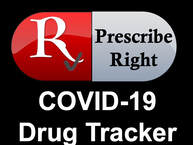|
COVID-19 Vaccines
Researchers at the Icahn School of Medicine compared the antibody response to the Pfizer-BioNTech and Moderna COVID-19 vaccines in 43 recovered COVID-19 patients to 67 healthy volunteers. The seronegative patients had a low, but variable response after the first vaccination, while the seropositive patients had antibody titers that were 10 to 45 times higher. After the second dose there was a three-fold increase in healthy patients, but no increase in recovered patients. The CDC analyzed surveillance data from 30,494 patients who were vaccinated with either the Pfizer-BioNTech or Moderna COVID-19 vaccines during pregnancy and found the rates of complications were not significantly different from those of unvaccinated pregnant women. Novavax announced that in a 15,000 patient, Phase III trial (NCT04583995), two doses of NVX-CoV2373 given 21-days apart resulted in 89.7% efficacy based on 106 cases of moderate to severe COVID-19 that developed in the United Kingdom study population. Five cases of severe disease occurred, and all were in the placebo group. Efficacy was 96.4% against the original COVID-19 strain and 86.3% against the B.1.1.7 (UK) variant. Novavax announced that in a 2,905 patient, Phase IIb trial (NCT04533399), where two doses of the Novavax COVID-19 vaccine given 21-days apart resulted in 48.6% efficacy based on 147 cases of moderate to severe COVID-19. Five cases of severe disease occurred, and all were in the placebo group. Efficacy was 55.4% among HIV negative patients. The trial population included 240 medically stable, HIV-positive adults. Most cases of COVID-19 were the B.1.351 (South African) variant. Researchers at Johns Hopkins analyzed a convenience sample of 436 transplant patients who were immunized with the Moderna or Pfizer COVID-19 vaccines and detected an antibody response about three weeks after the first immunization in only 17% of patients. Patients were more likely to develop antibodies if they were younger or received the Moderna vaccine. Patients were less likely to show an antibody response if they were receiving anti–metabolite maintenance immunosuppression (mycophenolate or azathioprine). Researchers from Yale and the CDC analyzed COVID-19 vaccine efficacy in 463 nursing home residents during outbreaks at two Connecticut skilled nursing facilities. Vaccine efficacy was measured from 14 days after the first dose through seven days after the second, because there was not enough follow-up data to determine the impact of full vaccination. The researchers found the vaccines to be as effective as in the general adult population. Sanofi has signed an agreement with Translate Bio for an mRNA vaccine. Sanofi and Translate Bio are evaluating the COVID-19 vaccine, MRT5500 in a 415 patient, Phase I/II trial with results expected in 3Q21. In a 2,026 patient, South-African, Phase I/II trial (NCT04444674), 2.5% of patients that received the AstraZeneca COVID-19 vaccine became infected with COVID-19 compared to 3.2% with placebo for a vaccine efficacy of 21.9% in HIV negative adults. 92.9% of COVID-19 infections were caused by the B.1.351 (South African) variant. Vaccine efficacy against the B.1.351 variant was 10.4%. The researchers also tested antibodies from 25 patients and found that vaccine recipients had no neutralization activity against the B.1.351 variant COVID-19 Antibodies Lilly announced results from a 796 patient cohort that compared a lower dose of bamlanivimab and etesevimab in the BLAZE-1 trial (NCT04427501), where 0.8% of patients treated with bamlanivimab 700 mg and etesevimab 1400 mg experienced the primary endpoint of COVID-19 related hospitalizations or death compared to 5.8% that received placebo. GSK and Vir announced that in an interim analysis of data from 583 patients enrolled in the 1,300 patient, Phase III, COMET-ICE trial (NCT04545060), treatment with VIR-7831 reduced the risk for hospitalization or death by 85% compared to placebo in patients with mild to moderate COVID-19 who are at high risk of progression to severe disease. Due to the magnitude of benefit, the Independent Data Monitoring Committee (IDMC) recommended stopping the trial. Based on results from COMET-ICE, GSK and VIR plan to request an emergency use authorization (EUA) for VIR-7831. COVID-19 Anti-Inflammatories Roche announced that in the 28-day, 450 patient, Phase III REMDACTA trial (NCT04409262), adding tocilizumab to remdesivir did not decrease time to hospital discharge compared to remdesivir alone in patient with severe COVID-19. The addition of tocilizumab also did not improve clinical status, decrease mortality, or decrease the need for mechanical ventilation. Comments are closed.
|
Stay informed, subscribe to the Prescribe Right Pharmaceutical Pipeline Tracker
Archives
January 2023
Categories |
Services |
Company |
Support |
© COPYRIGHT 2015. ALL RIGHTS RESERVED.
|


 RSS Feed
RSS Feed